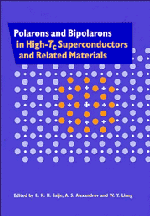Book contents
- Frontmatter
- Contents
- Preface
- 1 A polaron theory of high-temperature superconductors
- 2 On the possibility of non-BCS superconductivity
- 3 A bipolaron Bose liquid in high-Tc superconductors
- 4 Spin polarons in high-Tc superconductors
- 5 The polaron scenario for high-Tc superconductors
- 6 Formation, phase separation and superconductivity of large bipolarons
- 7 Polarons and bipolarons in WO3−x and YBa2Cu3O7
- 8 Polaron bands in the far- and mid-infrared spectra of e-doped cuprates
- 9 Electron–phonon interaction of non-equilibrium carriers in the photoinduced state of YBa2Cu3O7−δ
- 10 Experimental evidence of local lattice distortion in superconducting oxides
- 11 The Hall effect due to small polarons and conduction in narrow energy bands
- 12 Static and dynamic conductivity of untwinned Y1Ba2Cu4O8: gaps or condensation?
- 13 The near infrared and optical absorption of high- Tc superconductors using powders
- 14 Polaronic theory of mid-infrared conductivity: a numerical cluster study
- 15 Electromagnetic properties of local pair superconductors
- 16 Electron–hole asymmetric polarons
- 17 On the nature of the superconducting state in high-Tc cuprates
- 18 High- Tc superconductivity with polarons and bipolarons: an approach from the insulating states
- 19 Coexistence of small-polaron and Anderson localization in high- Tc superconducting materials
- 20 Concentration and temperature-dependence of magnetic polaron spectra in the t–J model
- 21 Mass enhancement without band-narrowing in t–t′–J and related models: predictions for Fermi-surface and optical conductivity
- 22 Polarons in Peierls–Hubbard models
- 23 Exact estimates of inter-polaron coupling constants resulting in bipolaron formation
- 24 Coulomb interaction and the criteria for bipolaron formation
- 25 Large bipolarons and high-Tc materials
- 26 Collective excitations in the ground state of a two-dimensional attractive Fermi gas
- 27 Strong two-band electron self-trapping, state hybridization effects and related pressure-induced phenomena in semiconductors
- 28 Bismuth disproportionation in super- and semiconducting barium bismuthates
- 29 Magnetic polarons in concentrated and diluted magnetic semiconductors
- 30 Energy scales of exotic superconductors
- Index
21 - Mass enhancement without band-narrowing in t–t′–J and related models: predictions for Fermi-surface and optical conductivity
Published online by Cambridge University Press: 24 November 2009
- Frontmatter
- Contents
- Preface
- 1 A polaron theory of high-temperature superconductors
- 2 On the possibility of non-BCS superconductivity
- 3 A bipolaron Bose liquid in high-Tc superconductors
- 4 Spin polarons in high-Tc superconductors
- 5 The polaron scenario for high-Tc superconductors
- 6 Formation, phase separation and superconductivity of large bipolarons
- 7 Polarons and bipolarons in WO3−x and YBa2Cu3O7
- 8 Polaron bands in the far- and mid-infrared spectra of e-doped cuprates
- 9 Electron–phonon interaction of non-equilibrium carriers in the photoinduced state of YBa2Cu3O7−δ
- 10 Experimental evidence of local lattice distortion in superconducting oxides
- 11 The Hall effect due to small polarons and conduction in narrow energy bands
- 12 Static and dynamic conductivity of untwinned Y1Ba2Cu4O8: gaps or condensation?
- 13 The near infrared and optical absorption of high- Tc superconductors using powders
- 14 Polaronic theory of mid-infrared conductivity: a numerical cluster study
- 15 Electromagnetic properties of local pair superconductors
- 16 Electron–hole asymmetric polarons
- 17 On the nature of the superconducting state in high-Tc cuprates
- 18 High- Tc superconductivity with polarons and bipolarons: an approach from the insulating states
- 19 Coexistence of small-polaron and Anderson localization in high- Tc superconducting materials
- 20 Concentration and temperature-dependence of magnetic polaron spectra in the t–J model
- 21 Mass enhancement without band-narrowing in t–t′–J and related models: predictions for Fermi-surface and optical conductivity
- 22 Polarons in Peierls–Hubbard models
- 23 Exact estimates of inter-polaron coupling constants resulting in bipolaron formation
- 24 Coulomb interaction and the criteria for bipolaron formation
- 25 Large bipolarons and high-Tc materials
- 26 Collective excitations in the ground state of a two-dimensional attractive Fermi gas
- 27 Strong two-band electron self-trapping, state hybridization effects and related pressure-induced phenomena in semiconductors
- 28 Bismuth disproportionation in super- and semiconducting barium bismuthates
- 29 Magnetic polarons in concentrated and diluted magnetic semiconductors
- 30 Energy scales of exotic superconductors
- Index
Summary
Abstract
An analytically solvable Ansatz set of Migdal-type self-consistent equations is proposed for the coupling between spin and charge degrees of freedom in the strongly correlated electron system described by the t–t′–J(t–J) Hamiltonian. The small parameter validating Migdal's approximation for this problem is found to be 1/ln(U/t) (when U»t), where U and t are on-site Coulomb repulsion energy and the bare electron hopping integral of the basic Hubbard Hamiltonian (t′ = J =4t2/U). The analytical results, obtained for electron concentrations close to half-filling, demonstrate strong enhancement of the quasi-particle mass, accompanied by a depletion of the particle density of states at the Fermi-level (EF). The spectral density is pushed away from EF into a broad range of energies (of order t) and possesses a sawtooth form. Theoretical predictions for the optical conductivity are derived, which could provide a qualitative explanation of the mid-infrared anomaly observed experimentally in high-Tc cuprates. The variation in quasi-particle energy over the Brillouin zone is found to be of order J only, in good accord with previous theoretical work and the dispersion observed in recent ARPES experiments in 2212 high- Tc compounds.
Introduction and summary of our previous work
It is by now generally accepted that strong Coulomb correlations should play an essential role in the physics of the high-temperature superconductors (HTS). A great number of experimental results obtained since the discovery [1] of the HTSs raise strong doubts about the applicability of ‘classical’ BCS theory to the description of the superconductivity phenomena in these compounds.
Information
- Type
- Chapter
- Information
- Publisher: Cambridge University PressPrint publication year: 1995
